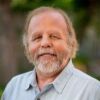Hunter S. Thompson said, “Life should not be a journey to the grave with the intention of arriving safely in a pretty and well-preserved body, but rather to skid in broadside in a cloud of smoke, thoroughly used up, totally worn out, and loudly proclaiming ‘Wow!’” I’m a long way from skidding into a grave or the anatomy lab of a third-rate medical school. That said, having just passed my 60th birthday, I’m going to use that as permission to reflect on a favorite topic, mentorship.
When I started my career, I was fortunate to have a couple of folks take me under their wing, guide my choices and open doors. I was an 18-year-old EMT who had become curious about EKGs. Margie, a nurse practitioner and one of my early mentors, handed me a copy of Rapid Interpretation of EKGs, a self-study guide to basic EKG interpretation.
I loved it. When I gave it back to her, she invited me to attend a 5-day advanced EKG workshop with her. There were 200 cardiologists studying for their boards, 10 critical care nurses, and one EMT in the audience. While I didn’t understand 95% of what they talked about, I took five notebooks’ worth of notes. That bit of mentoring evolved into my first conference presentation, my first series of articles and a book.
When I started consulting, my mentor, Jack Stout, said, “Never take a consulting job where you need the money. If you do, you’ll be tempted to compromise the quality of your work. You always have to be willing to walk away.” Over the years, I’ve had a couple of lucrative gigs that I walked away from because patient care was going to be compromised. While it’s tempting to stay for a sizable payday, it’s so much better to stay aligned with my purpose and maintain my integrity.
Mentorship in EMS come full circle
As the years progressed, a few people have invited me to teach and mentor them. There are few things more rewarding than having folks who’ve attended my classes, read my articles or worked with me do well. Over the last few years, I’ve noticed that things are coming full circle. I was visiting with Lauri McFadden, director of the Alameda County EMS Agency and her leadership team. They are customers of FirstWatch, customers of mine. I report to them and follow their lead. Just a few years ago, most of them used to report to me.
I was visiting with one of my bosses, Lee Jenkins, M.D., M.S., FACEP, chair of the Department of Emergency Health Services at UMBC, discussing a book she’s writing. She’s a wonderful physician, academician and leader. I really enjoy being part of the team that she leads. During our conversation, she reminded me that she used to be one of my graduate students.
My favorite story in this thread is about Dave Williams, Ph.D. Dave was one of my first graduate students nearly two decades ago. At the time, he was working for Austin Travis County EMS and had just gotten promoted to a commander position over quality improvement. One of the assignments in our class is to write an article for submission to a non-peer review EMS journal. My theory is that by the time folks are this far along in their formal education, they have written enough APA style academic papers and that it’s important to be able to write for “normal” people.
Dave took this assignment seriously and his article, “Sharing the Wealth: Creating Future EMS Leaders Through Effective Management Mentoring” was published in March 2001. I’ve lost count of how many articles he’s published since then. When he was ready to move into the consulting world, I wrote a letter of recommendation for him to join Fitch and Associates. He flourished as a consultant, author and educator.
His interest in quality and performance improvement continued, and I invited him to join me for one of the annual Institute for Healthcare Improvement National (IHI) Forums in Orlando, Florida. This meeting attracts thousands of folks from around the world focused on improving healthcare. They say that, “Your vibe attracts your tribe” and Dave had clearly found his!
Working with IHI over the last decade, Dave has become one of just a handful of healthcare quality improvement scientists. As a scholar-practitioner, he’s lead healthcare improvement efforts from Qatar, to Scotland, to Kaiser Permanente, the Military Health Service, Catholic Health Partners and the NHS. He’s created the chief quality officer education and credentialing program for IHI, the highest improvement science credential in healthcare. He collaborated with IHI founding president Don Berwick, M.D. and Harvard Medical School Professor Don Goldman, M.D. to create Practical Improvement Science in Healthcare a Massive Online Open Course (MOOC) for Harvard. Dave also served as IHI’s liaison to the Bill and Melinda Gates Foundation.
Dave has become my primary mentor for all things improvement-related. We’ve had a standing phone call once a week for more than 10 years. I love being a student of my former student! He’s masterful at making ridiculously complex concepts understandable. For example, he created a way to teach the Plan Do Study Act cycle using Mr. Potato Head. He challenges conventional wisdom on all kinds of topics. If you’d like to get in on some of his wisdom, his blog and newsletter are good places to start.
According to leadership author Tom Peters, “The greatest leaders are those who don’t look for followers. They are trying to create more leaders in order to help many others to find and create their own destinies.” I’m grateful to Margie, Jack, Dave and others for helping me along this path.
Listen for more: Inside EMS Podcast: How to develop a culture of mentorship in EMS
This article was originally posted July 18, 2019. It has been updated.













